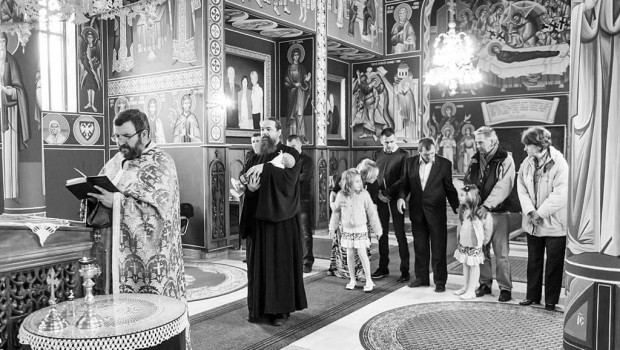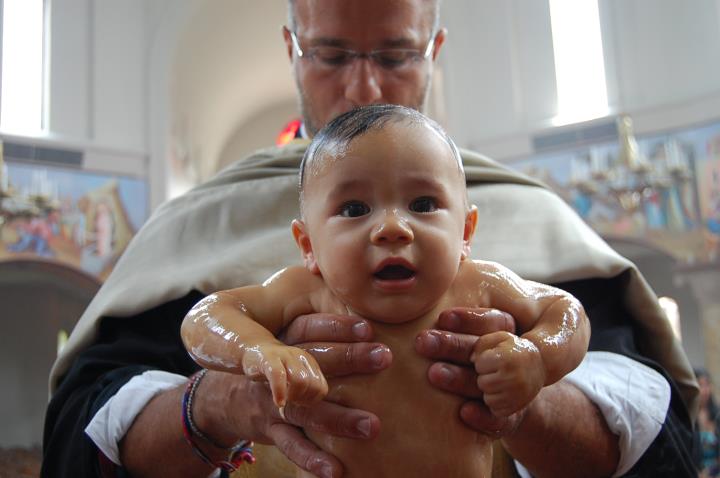
by Fr. Lawrence Farley
The parents may say, “Church is very, very important,” but if they do not go to church every week and devoutly receive Holy Communion, and say their private prayers, and pray at meal-times, such exhortations will be recognized by children for the hypocritical clap-trap it is.
When infants are brought to the baptismal font, they not only come with parents and friends, but also their sponsors—traditionally in churches of the Russian tradition, a man and a woman. These sponsors have liturgical duties to perform during the service, such as holding the child, and making the responses when the priest requires that the child renounce Satan and unite himself to Christ. But there are other duties as well, which remain after the service is over.
In the classic “Priest’s Guide” as quoted by Archpriest David Abramtsov, we read the following:
“The sponsors in Baptism are guarantors pledging to the Church that the baby to be baptized will be brought up in the faith of that Church; therefore they must be members of the Holy Orthodox Catholic Church.”
Father David also writes,
“Among the other duties of sponsors is the duty of seeing that their godchildren receive Holy Communion frequently, that they attend Sunday School and church regularly, that they learn their prayers and fulfill all the other requirements of the Orthodox Faith.”
Sounds good. The only problem is that given our modern North American nuclear family, it is difficult for anyone to promise that their godchildren will fulfill these duties if the parents do not do their bit. And rash promises aside, we should be clear: if the parents do not raise their children in piety and faith, making sure that a living faith is communicated to their offspring, there is precious little that a godparent can do about it. A sponsor can nag, of course, and encourage, and maybe even plead. But the overwhelming lion share of responsibility falls with the parents, and especially with the dad.
The reality is that children learn what is important by observing what their parents do. Grandparents can inspire and influence to some degree, but theirs is a subordinate and supportive role. The parents will model piety for their children (or not), and this will provide the formative effect. Note: the children will learn from what their parents actually do, not just what they say. The parents may say,
“Church is very, very important,”
but if they do not go to church every week and devoutly receive Holy Communion, and say their private prayers, and pray at meal-times, such exhortations will be recognized by children for the hypocritical clap-trap it is. That is, the exhortations will have no lasting effect. In such a house where the parents do not exercise a living faith, the effect of the godparents’ exhortations and offers will be distinctly minimal. Auntie Sophie and Uncle Walter can be as winning and loving as ever, but their winning love cannot compensate for the poor examples of the parents.
One might be tempted to ask: this being the case, what’s the point of having sponsors? One might begin an answer by looking at how sponsorship functioned in the early Church. In those days, all candidates for baptism had sponsors, even the adults.
The pilgrim known to scholars as “Egeria” tells us in her memoirs of her trip to the Holy Land how baptismal sponsorship functioned in Jerusalem in her day. She writes,
“On the second day of Lent at the start of the eight weeks, the bishop’s chair is placed in the middle of the Great Church, the Martyrium, the presbyters sit in chairs on either side of him, and all the clergy stand. Then one by one those seeking baptism are brought up, men coming with their fathers and women with their mothers. As they come in one by one, the bishop asks their neighbours questions about them: ‘Is this person leading a good life? Does he respect his parents? Is he a drunkard or a boaster?’ He asks about all the serious human vices. And if his inquiries show him that someone has not committed any of these misdeeds, he himself puts down his name; but if someone is guilty he is told to go away, and the bishop tells him that he is to amend his ways before he may come to the font.”
Thus in the early Church the function of the sponsors was to witness to the propriety of the baptism by testifying that the catechumenal candidate was indeed living a Christian life. (Presumably in cases of infant baptism, the issue was whether or not the parents of the infant candidate were living a Christian life.)
At very least then, sponsors function as vestigial witnesses to the nature of Christian discipleship. Baptism is not simply a “get it over with” sort of thing, like a child’s first vaccination. It is the beginning of a life of commitment to Christ and of striving for holiness. The presence of sponsors reveals that something is required of the candidate after the service is all over, and that this requirement is life-long. Baptism is thus like enrollment in school—the process of enrollment is important, but it is essentially meaningless unless one follows it up by actually going to school, attending classes, studying, and taking exams. Enrollment in school looks forward to the day of graduation; baptism looks forward to the day when we die and step into the Kingdom. Auntie Sophie and Uncle Walter stand by as sponsors and point the little candidate to that final and glorious day.

